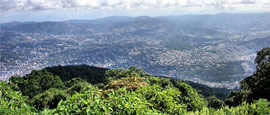Caracas History
Caracas is a city that has dusted itself down more times than it probably cares to remember, but its story is one that locals will never get bored of retelling.
When Francisco Fajardo (a half-Spanish, half-indigenous Guaiquerí conquistador) set up a ranch between Cumaná and Coro in 1557, he could have never imagined that he was laying the foundations for Venezuela’s future capital city.
Perhaps even less so when the town built upon his ranch only four years later was destroyed in attacks by indigenous Indians.
Rebuilt and resettled in 1567, the city was renamed Santiago de León de Caracas. It grew into a city of cobbled streets and small plazas, becoming a provincial capital a decade later.
English pirates took what they could in 1595, before rattling earthquakes in 1755 and 1812 wiped out what was left.
When smallpox killed many of the indigenous attackers, Caracas began to swell in size and stature, helped by the gold and cocoa found in its valley.
The city’s most famous son, Simón Bolívar, was born in 1783, and 30 years later he returned to take over Caracas.
And when Gran Colombia (now Colombia, Ecuador, Panama and Venezuela) won independence in 1821, Caracas was chosen as the capital city of Venezuela.
President (and dictator) Antonio Guzmán Blanco helped modernise the city, basing its wide streets on Paris and hailing in a railway system.
Under successive dictators, petroleum exports ushered in a period of affluence for many as the population swelled. High-rises sprouted, but shanty towns began to appear.
Thousands of the poor on the hillsides died following an earthquake in 1967, during riots and looting in 1989, and then floods and mudslides in 1999.
Demonstrations and crime are still rife today with the city still suffering from inequality and poverty.
Did you know?
• In 2004, protesters toppled a statue of Christopher Columbus after Columbus Day was renamed Indigenous Resistance Day.
• Many street corners are named after events that happened there – look out for Misery Corner, Dead Man’s Corner or Danger Corner.
• Caracas is said to be the witch capital of the world.
Do you have any Feedback about this page?
© 2026 Columbus Travel Media Ltd. All rights reserved. No part of this site may be reproduced without our written permission, click here for information on Columbus Content Solutions.




 You know where
You know where